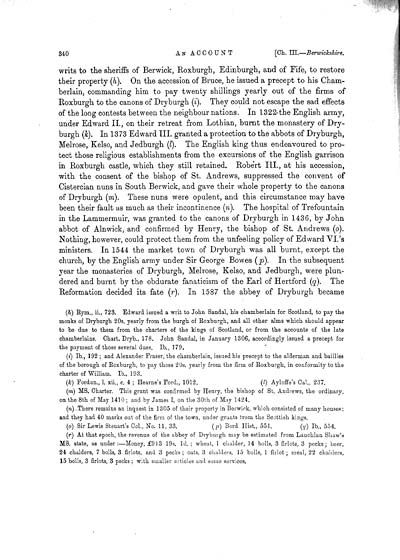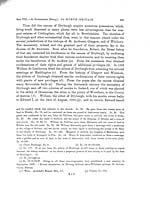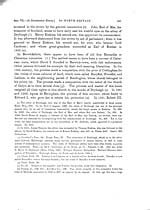Volume 3
(352) Page 340
Download files
Individual page:
Thumbnail gallery: Grid view | List view

340 writs to the sheriffs of Berwick, Roxburgh, Edinburgh, and of Fife, to restore their property (h). On the accession of Bruce, he issued a precept to his Cham- berlain, commanding him to pay twenty shillings yearly out of the firms of Roxburgh to the canons of Dryburgh (i). They could not escape the sad effects of the long contests between the neighbour nations. In 1322 the English army, under Edward II., on their retreat from Lothian, burnt the monastery of Dry- burgh (k). In 1373 Edward III. granted a protection to the abbots of Dryburgh, Melrose, Kelso, and Jedburgh (l). The English king thus endeavoured to pro- tect those religious establishments from the excursions of the English garrison in Roxburgh castle, which they still retained. Robert III., at his accession, with the consent of the bishop of St. Andrews, suppressed the convent of Cistercian nuns in South Berwick, and gave their whole property to the canons of Dryburgh (m). These nuns were opulent, and this circumstance may have been their fault as much as their incontinence (n). The hospital of Trefountain in the Lammermuir, was granted to the canons of Dryburgh in 1436, by John abbot of Alnwick, and confirmed by Henry, the bishop of St. Andrews (o). Nothing, however, could protect them from the unfeeling policy of Edward VI.'s ministers. In 1544 the market town of Dryburgh was all burnt, except the church, by the English army under Sir George Bowes (p). In the subsequent year the monasteries of Dryburgh, Melrose, Kelso, and Jedburgh, were plun- dered and burnt by the obdurate fanaticism of the Earl of Hertford (q). The Reformation decided its fate (r). In 1587 the abbey of Dryburgh became (h) Rym., ii., 723. Edward issued a writ to John Sandal, his chamberlain for Scotland, to pay the monks of Dryburgh 20s. yearly from the burgh of Roxburgh, and all other alms which should appear to be due to them from the charters of the kings of Scotland, or from the accounts of the late chamberlains. Chart. Dryb., 178. John Sandal, in January 1306, accordingly issued a precept for the payment of those several dues. Ib., 179. (i) Ib., 192 ; and Alexander Fraser, the chamberlain, issued his precept to the alderman and baillies of the borough of Roxburgh, to pay those 20s. yearly from the firm of Roxburgh, in conformity to the charter of William. Ib., 193. (k) Fordun., 1. xii., c. 4 ; Hearne's Ford., 1012. (l) Ayloffe's Cal., 237. (m) MS. Charter. This grant was confirmed by Henry, the bishop of St. Andrews, the ordinary, on the 8th of May 1410 ; and by James I. on the 30th of May 1424. (n) There remains an inquest in 1305 of their property in Berwick, which consisted of many houses ; and they had 40 marks out of the firm of the town, under grants from the Scottish kings. (o) Sir Lewis Steuart's Col., No. 11, 33. (p) Bord Hist., 551. (q) Ib., 554. (r) At that epoch, the revenue of the abbey of Dryburgh may be estimated from Lauchlan Shaw's MS. state, as under :�Money, �913 19s. Id. ; wheat, 1 chalder, 14 bolls, 3 firlots, 3 pecks; beer, 24 chalders, 7 bolls, 3 firlots, and 3 pecks; oats, 3 chalders, 15 bolls, 1 firlot ; meal, 22 chalders, 15 bolls, 3 firlots, 3 pecks ; with smaller articles and some services.
Set display mode to:
![]() Universal Viewer |
Universal Viewer | ![]() Mirador |
Large image | Transcription
Mirador |
Large image | Transcription
Images and transcriptions on this page, including medium image downloads, may be used under the Creative Commons Attribution 4.0 International Licence unless otherwise stated. ![]()
| Caledonia, or, An account, historical and topographic of North Britain from the most ancient to the present times > Volume 3 > (352) Page 340 |
|---|
| Permanent URL | https://digital.nls.uk/74528778 |
|---|---|
| Description | Vol. III. |
|---|---|
| Attribution and copyright: |
|

